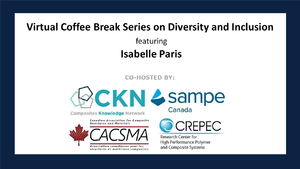D&I featuring Isabelle Paris - A350
| D&I featuring Isabelle Paris | |
|---|---|
| Perspectives article | |

| |
| Document Type | Article |
| Document Identifier | 350 |
|
Webinar Date
Featuring
Isabelle Paris
| |
Introduction[edit | edit source]
This D&I Coffee Break session features Dr. Rowan Thomson, Canada Research Chair and Professor of Physics at Carleton University, where she is also Associate Dean (Equity, Diversity, and Inclusion) in the Faculty of Science.
In this session, Dr. Thomson will speak on “Actions to advance equity, diversity, and inclusion,” followed by a moderated discussion and an opportunity to connect with colleagues across Canada in an informal setting.
The virtual coffee break series is presented by CKN, SAMPE Canada, CACMSA and CREPEC. Topics will include the importance of D&I, mentorship, allyship, how to make your workplace more inclusive, unconscious bias, and more.
Biography[edit | edit source]
Rowan Thomson is Canada Research Chair and Professor of Physics at Carleton University where she is also Associate Dean (Equity, Diversity, and Inclusion) in the Faculty of Science. She holds a BSc Double Honours Mathematics and Physics from Carleton University. Her PhD research was in theoretical high-energy physics (Superstring Theory) at Perimeter Institute and the University of Waterloo, and was awarded Waterloo’s Pearson Medal.
Post-PhD, Dr. Thomson’s research has focused on medical physics; distinctions include Ontario’s Polanyi Prize in Physics (2011), Ontario Early Researcher Award (2015), Fellow of the American Association of Physicists in Medicine (2020), and Member of the Royal Society of Canada College of New Scholars, Artists, and Scientists (2022). Prof. Thomson has great enthusiasm for teaching and mentoring next generations of scientists, and advancing equity, diversity, and inclusion.
Video[edit | edit source]
| About | Help |
Welcome
Welcome to the CKN Knowledge in Practice Centre (KPC). The KPC is a resource for learning and applying scientific knowledge to the practice of composites manufacturing. As you navigate around the KPC, refer back to the information on this right-hand pane as a resource for understanding the intricacies of composites processing and why the KPC is laid out in the way that it is. The following video explains the KPC approach:
Understanding Composites Processing
The Knowledge in Practice Centre (KPC) is centered around a structured method of thinking about composite material manufacturing. From the top down, the heirarchy consists of:
- The factory
- Factory cells and/or the factory layout
- Process steps (embodied in the factory process flow) consisting of:
The way that the material, shape, tooling & consumables and equipment (abbreviated as MSTE) interact with each other during a process step is critical to the outcome of the manufacturing step, and ultimately critical to the quality of the finished part. The interactions between MSTE during a process step can be numerous and complex, but the Knowledge in Practice Centre aims to make you aware of these interactions, understand how one parameter affects another, and understand how to analyze the problem using a systems based approach. Using this approach, the factory can then be developed with a complete understanding and control of all interactions.
Interrelationship of Function, Shape, Material & Process
Design for manufacturing is critical to ensuring the producibility of a part. Trouble arises when it is considered too late or not at all in the design process. Conversely, process design (controlling the interactions between shape, material, tooling & consumables and equipment to achieve a desired outcome) must always consider the shape and material of the part. Ashby has developed and popularized the approach linking design (function) to the choice of material and shape, which influence the process selected and vice versa, as shown below:
Within the Knowledge in Practice Centre the same methodology is applied but the process is more fully defined by also explicitly calling out the equipment and tooling & consumables. Note that in common usage, a process which consists of many steps can be arbitrarily defined by just one step, e.g. "spray-up". Though convenient, this can be misleading.
Workflows
The KPC's Practice and Case Study volumes consist of three types of workflows:
- Development - Analyzing the interactions between MSTE in the process steps to make decisions on processing parameters and understanding how the process steps and factory cells fit within the factory.
- Troubleshooting - Guiding you to possible causes of processing issues affecting either cost, rate or quality and directing you to the most appropriate development workflow to improve the process
- Optimization - An expansion on the development workflows where a larger number of options are considered to achieve the best mixture of cost, rate & quality for your application.
To use this website, you must agree to our Terms and Conditions and Privacy Policy.
By clicking "I Accept" below, you confirm that you have read, understood, and accepted our Terms and Conditions and Privacy Policy.





